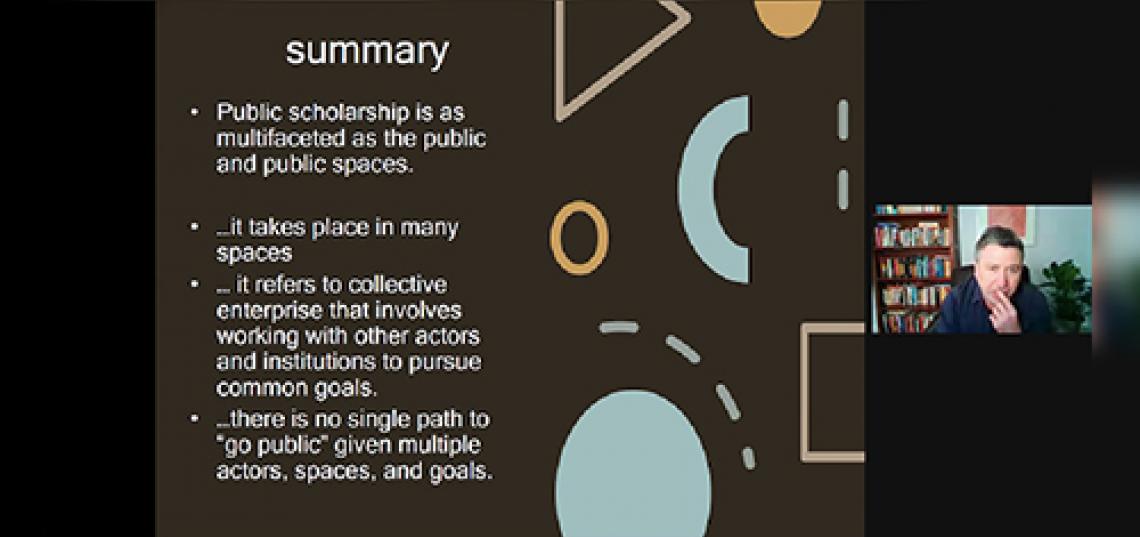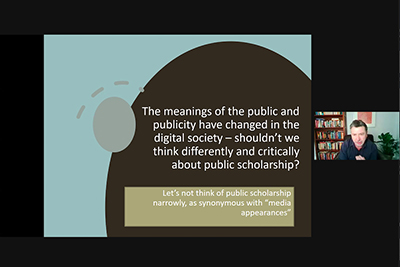
What does it mean to be an engaged scholar? How can such work benefit as many communities and populations as possible? How does the practice of engaged scholarship extend beyond media appearances? How should faculty be recognized and rewarded by the academy for such work?
These are just a few of the issues discussed by the SC&I faculty during the school’s fourth annual spring Scholarship Incubator, held virtually this year and titled “Engaged Scholarship for Media, Information, and Communication- Ideas, Challenges, and Inspirations.”
The aim of the Scholarship Incubator was to provide a forum for SC&I faculty to discuss and recognize engaged scholarship at the school and expand the capacity for talking about it and understanding its merits.
Organized by Associate Dean for Research Mark Aakhus and Associate Dean for Programs Dafna Lemish, Aakhus said the aim of the Scholarship Incubator was to provide a forum for SC&I faculty to discuss and recognize engaged scholarship at the school and expand the capacity for talking about it and understanding its merits.
He said, “The outcomes of our discussion will help us play an important role moving forward in addressing engagement in our scholarship. We are at a public university with a public mission. And yet while public and community-engaged scholarship has been significant in the work that many of our faculty do, it sometimes has an awkward fit in academic operations.”
Aakhus said Rutgers has already taken the lead in defining the university’s concept of what community-engaged scholarship is and how it values, evaluates, and rewards faculty for such work by creating a set of guidelines. Using these guidelines “as an anchor point into a much broader discussion about engaged research, including how we value it, mentor it, and support it” was a goal of the Scholarship Incubator.
Dean Jonathan Potter said, “It would be hard to imagine a more contemporary issue than this year’s Scholarship Incubator theme, nor an issue which is more fitted to SC&I and Rutgers and what they represent. Nevertheless, it’s a theme that is hard, complex, and challenging. For a research-intensive university such as Rutgers, it is also one that really encourages us to think very carefully. It’s going to be important to us as a community because engaged scholarship is going to be at the center of research strategies and the ways we think of and envision ourselves as a community and a school.”
A highlight of the Scholarship Incubator was a keynote lecture delivered by Silvio Waisbord, a former SC&I faculty member who is now a director and professor in the School of Media and Public Affairs at George Washington University in Washington, D.C., and the author of the book “The Communication Manifesto.” He graciously made copies of the book available for SC&I to distribute prior to the event.
 Waisbord spoke about the various ways academics can understand themselves as public scholars; the conditions in universities and professional cultures that support faculty who undertake this kind of work; changes in society that are driving and increasing interest in public scholarship; ways to understand the challenges involved in practicing engaged scholarship; what the academy needs to do to recognize, value, and reward it; and the steps scholars need to take if they are committed to moving from talking or theorizing about public scholarship to action.
Waisbord spoke about the various ways academics can understand themselves as public scholars; the conditions in universities and professional cultures that support faculty who undertake this kind of work; changes in society that are driving and increasing interest in public scholarship; ways to understand the challenges involved in practicing engaged scholarship; what the academy needs to do to recognize, value, and reward it; and the steps scholars need to take if they are committed to moving from talking or theorizing about public scholarship to action.
“I think of public scholars as translators and brokers who are positioned between academic and non-academic worlds, people who know and feel comfortable in an in-between position, who are cognizant of the needs and priorities between various publics,” Waisbord said. “They are not people who just translate academic research to others but are people who engage with others in order to figure out: what is it about academic scholarship that is relevant, that is helpful? It’s more about trying to find common ground with publics rather than going to others to tell them what we know.”
Practicing engaged scholarship should not be limited to speaking with the media and writing op-eds, Waisbord said. While he emphasized that these actions are important and effective, ultimately, faculty need to understand engaged scholarship as a means to “address the communication problems embedded in fundamental social problems, from social exclusion to misinformation.”
Another important feature of the Scholarship Incubator was break-out sessions designed to facilitate small discussions. Faculty members participated in the break-out discussion via “zoom” rooms that were moderated by a faculty member while others helped note key ideas that emerged in the discussion.
These discussions resulted in many important ideas about how SC&I can move forward with a plan to better understand, implement, and increase the practice of engaged scholarship at the school. Aakhus said that some key takeaways from the faculty discussion included:
The Rutgers guidelines are a step forward but resemble a compendium of different suggestions rather than a coherent set of policies and practices. This still leaves much to be done with translating but also with working through the concept of public and community-engaged scholarship. For instance,
- Requiring or expecting letters in the review packet from the community is problematic.
- Innovative and novel as criteria should not be over-valued as these do not always equate with useful, effective, or quality with respect to the community. An alternative might be the consideration of whether the work is catalytic.
- Avoid developing one-size-fits-all criteria, which then requires understanding the array of public and community-engaged scholarship.
- Recognizing the challenge of developing indicators of good work and not letting the indicators be driven by possibly irrelevant conventions about criteria. This requires thoughtfulness in establishing indicators of the quality of the work and the nature of the impact.
- Understanding that public and community engagement is not a new requirement for tenure and promotion, but recognizing that it can be specified as part of how someone goes forward in the process.
Additionally, the faculty agreed that SC&I needs to continue working on the meaning of engaged research and scholarship within the school. This will have to happen at all levels, and some matters may need to be brought forward within Rutgers to advance the guidelines and support. For instance,
- Translating engaged work to existing evaluation procedures, while addressing changes to evaluation procedures to better accommodate engaged research.
- Considering the effective support and mentoring of engagement as part of scholarship across the career trajectory.
- Refining and developing support for public and community-engaged work.
Innovative and novel as criteria should not be over-valued as these do not always equate with useful, effective, or quality with respect to the community. An alternative might be the consideration of whether the work is catalytic.
Another focal point of the event was a response given by Naomi Klein, the Gloria Steinem Endowed Chair in Media, Culture and Feminist Studies. Klein discussed her life as a prominent public intellectual, and she spoke of her experiences working with climate scientists who over time have become “radicalized by their work” to the point of deciding to devote time outside of their laboratories and classrooms to public scholarship in order to communicate their findings broadly to the public. Klein mentioned the risks some of them have taken by becoming public scholars, for example losing promotions or becoming unpopular among university administrators for doing work that was viewed as “disruptive.”Klein likened the climate crisis many scientists are addressing through public scholarship to a similar crisis she said is facing the fields scholars at SC&I study.
“We should ask ourselves whether our field is in an equivalency of crisis as those glaciologists and atmospheric scientists confronted when they decided that they needed to get out of their comfort zone and start getting engaged in a much more vocal way – to say our sphere – what we are studying – is collapsing beneath our feet,” Klein said. “We can’t even get the information we need to do our studies because these companies are run like black boxes. We are confronting absolute opacity and the scientists who are working for these companies – who one day might be our graduates – are getting fired for raising their voices about ethics in AI. This is what has been happening in this huge purge at Google. Are we doing enough? When we look at our colleagues – climate scientists who have gone so far out of their comfort zone and raised the alarm to the point where we can now say Rutgers is divesting from fossil fuels – are we also overly invested in the companies that are polluting our information ecology?”
Concluding the Scholarship Incubator, Lemish spoke of some of the questions SC&I must continue to explore and summed up the significance of the event. “How are we going to facilitate and support faculty and reward their work? Ultimately, what is the role of higher education in a democratic society? These questions will be with us for a long time. All we were able to do today was open it up and have a wonderful conversation.”
Discover more about the Rutgers School of Communication and Information on the website.
Images: Waisbord PPT/SC&I
